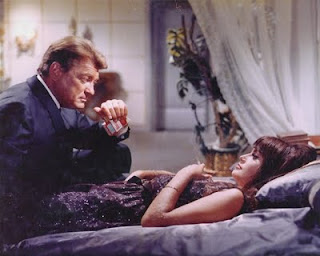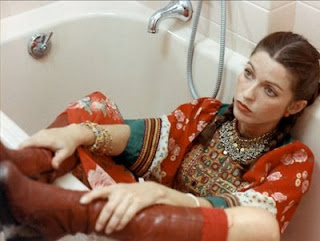Friday, April 29, 2011
MODERN FAIRY TALE
Growing up, my grandmother would coax me into good manners by saying; "you'll never get to Buckingham Palace that way." This became a commonly used expression in my family, but I think my grandmother said it with a shred of hope that I, somehow, would make it to Buckingham Palace and into William's arms. Her hopes were shattered this morning when William married Kate Middleton. The wedding was nothing short of a fairytale, complete with lace, hand-stitched red military suits, long trains, Rolls Royce, the Queen's tiara, and many, many outrageous hats. Kate looked blushing and beautiful in her Alexander McQueen by Sarah Burton dress. Her borrowed tiara and 8ft train gave the simple silhouette some high drama, suitable for the occasion. Most importantly, the couple could not have looked happier - after 8 years of on-and-off, they'll finally get their "happily ever after."
Wednesday, April 27, 2011
IN PRINT
What I've just finished:
Bossypants, Tina Fey
Autobiography. Fun and frivolous, narrated in Fey's signature witty, self-deprecating tone.
If you enjoy 30 Rock, READ THIS!
Look Me in the Eyes, John Elder Robinson
Autobiography. Story of a man's struggle growing up with Aspergers Syndrome.
For those who are unfamiliar with this disability, it's a great way to get into the mind of a person who struggles with high-functioning Autism.
A Whole New Mind, Daniel H. Pink
Non-fiction. Why right-brainers will rule the future; how technological changes will favor creative right-brainers instead of analytic lefties.
I'm a sucker for non-fiction, but this one does feel a bit repetitive and dry, at times. You can get the gist in the first hundred pages and skip the rest.
Bossypants, Tina Fey
Autobiography. Fun and frivolous, narrated in Fey's signature witty, self-deprecating tone.
If you enjoy 30 Rock, READ THIS!
Look Me in the Eyes, John Elder Robinson
Autobiography. Story of a man's struggle growing up with Aspergers Syndrome.
For those who are unfamiliar with this disability, it's a great way to get into the mind of a person who struggles with high-functioning Autism.
A Whole New Mind, Daniel H. Pink
Non-fiction. Why right-brainers will rule the future; how technological changes will favor creative right-brainers instead of analytic lefties.
I'm a sucker for non-fiction, but this one does feel a bit repetitive and dry, at times. You can get the gist in the first hundred pages and skip the rest.
DON'T SMOKE IN BED
 |
| Jane Greer: Promotional Photo for Out of the Past (1947) |
 |
| Marisa Mell w/ Jean Marais in Train D'enfer (1965) |
 |
| Audrey Hepburn w/ George Peppard in Breakfast at Tiffanys (1961) |
 |
| Nancy Kelly in Parachute Battalion |
 |
| Mamie Van Doren in Girls Town (1959) |
 |
| Marlene Dietrich in The Room Upstairs (1946) |
 |
| Romy Schneider in Max et les Ferrailleurs (1971) |
GAME CHANGER
HBO released the first promotional photo for their upcoming film Game Change. The film, which starts production today, follows the candidates of the 2008 presidential race on the republican ticket. Julianne Moore steps on Tina Fey's toes, looking strikingly similar to the infamous Alaskan. Moore, who was (ironically) originally cast as Hillary Clinton in the HBO film The Special Relationship, will play Sarah Palin. The film also includes Ed Harris as John McCain, Ron Livingston as Mark Wallace, Woody Harrelson as Steve Schmidt, and Melissa Farman (Temple Grandin) as Bristol Palin. No word on the release date of the film.
Tuesday, April 26, 2011
ITALIAN STALLION
Marcello Mastroianni was born September 28, 1924 in Fontana Liri, Italy; a small rural village adjacent to the Apennines Mountains. His mother, raised in Germany, was of Jewish decent. His father, Italian-born, owned a carpentry shop. During the Second World War, Mastroianni was temporarily interned at a German detainment camp out of which he escaped, fleeing to Venice where he hid out until the end of the war. In 1945, Mastroianni began working for an Italian film company, which prompted him to begin acting classes. A rookie at age 21, he booked his first job not long after; a small role in Riccardo Freda’s I Miserabili (1948). Audiences took notice of the young Mastroianni and it wasn’t long before he was promoted to leading man. Among his most critically acclaimed credits are: La Dolce Vita, 81/2, La Notte, Today and Tomorrow, Marriage Italian-Style, and Ready to Wear. Mastroianni was one part of possibly the most beloved and enduring screen couples in history; the other part being the incomparable Sofia Loren. Over the course of 20 years, the two appeared in 14 films together.
Mastroianni was married to Flora Carabella at the age of 24, and remained married until his death. However, he famously had a long affair with Catherine Deneuve later in life, with whom he had a daughter. Mastroianni died at 72 of pancreatic cancer.
COMING UP ROSES
The wind in LA is spectacular today. I woke up to the sound of swinging shudders in my apartment. Wind and sun can only mean that spring is in full bloom and there’s nothing quite like it. Here’s a visual essay in honor of springtime:
photos via: theglamouri, fashiontoast, knightcat, anneyhall
Monday, April 25, 2011
WORDY
 |
| via: thedayafteryoudie FLAME strike a match a-flame light that dances born from frictions weightless thing, fluttering light a fire with it. (my own) |
ON TO THE NEXT ADVENTURE
On April 24, 2011, Marie-France Pisier was found dead in her swimming pool.
Born May 10, 1944 in Dalat, Indochina (now Vietnam), she was raised in a highly intellectual family; daughter of a colonial governor and sister to a mathematician. She moved to Paris at the age of 12 and began her film career at 17. Her breakout role was in Francois Truffaut's Antoine and Colette (1962), beginning a lengthy collaboration with the legendary director. In 1980, she co-wrote Love on the Run with Truffaut, initiating her career as a screenwriter. Pisier worked actively on the international stage well into her 60s and shall be immortalized in her breadth of work.
Born May 10, 1944 in Dalat, Indochina (now Vietnam), she was raised in a highly intellectual family; daughter of a colonial governor and sister to a mathematician. She moved to Paris at the age of 12 and began her film career at 17. Her breakout role was in Francois Truffaut's Antoine and Colette (1962), beginning a lengthy collaboration with the legendary director. In 1980, she co-wrote Love on the Run with Truffaut, initiating her career as a screenwriter. Pisier worked actively on the international stage well into her 60s and shall be immortalized in her breadth of work.
DIARY OF A COUNTRY PRIEST
Diary of a Country Priest(1951), the poetic and hauntingly spiritual story of a young priest struggling for acceptance and, ultimately, survival, screened at LACMA this weekend in new 35mm print. The film, written and directed by Robert Bresson, is as literary a film as I've ever seen; the kind whose subtitles dissolve before you're ready to let go of the thought. Although the pacing is slow, even tedious, every scene is meticulously thought out. From a school girl's floating head in a confessional, to the low-angle shot of a priest on a motorbike, each frame is embedded with thought and dark spirituality. The first frame we see is of the priest's diary; beautiful scripted prose introducing his philosophy on journaling, revealed from behind a piece of blotting paper. The story, narrated by the priest's diary, is echoed in the subtle evolution of his script: from flowery cursive ink, to scribbled, uneven pencil. The diary entries; the first of hope and opinion, the last of despair, bookend the film. Diary of a Country Priest is also a great test for an actor, as the takes are long and the camera lingers in close-up. Bresson states in Notes on the Cinematographer; "hide the ideas, but so that people can find them. The most important will be the most hidden." This philosophy is never more clear than in Diary of a Country Priest.
The following is an excerpt from Andre Basin's Le Journal d'un Cure de Campagne and the Stylistics of Robert Bresson:
If Diary of a Country Priest impresses us as a masterpiece, and this with an almost physical impact, if it moves the critic and the uncritical alike, it is primarily because of its power to stir the emotions, rather than the intelligence, at their highest level of sensitivity.
The pattern of the film's unfolding is not that of tragedy in the usual sense, but rather in the sense of the medieval Passion Play, or better still, of the Way of the Cross, each sequence being a station along that road...Bresson never condenses the text; he cuts it. Thus what is left over is a part of the original. Like marble from a quarry, the words of the film continue to be a part of the novel. Of course the deliberate emphasis on their literary character can be interpreted as a search after artistic stylization, which is the very opposite of realism.
It is unlikely that there exists anywhere in the whole of French cinema, perhaps even in all French literature, many moment of more intese beauty than in the medallion scene between the cure and the countess. Its beauty does not derive from the acting or from psychological and dramatic values of the dialogue, nor indeed does it derive from the scene's intrinsic meaning. The true dialogue that punctuates that struggle between the inspires priest and a soul in despair is, of its very nature, ineffable. The decisive clashes of their spiritual fencing match therefore escape us. Their words announce, or prepare the way for, the fiery torch of grace.
Subscribe to:
Posts (Atom)












































